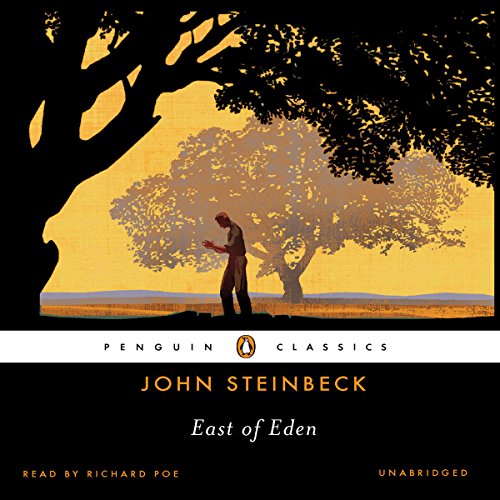
Above: "East of Eden," John Steinbeck. 602 Pages.
This is a powerful book about good and evil. Steinbeck raises the possibility that good or evil traits can be inherited. Cal, with seeming evil proclivities, possibly inherited from his clearly evil mother, wants to be good... tries to be good... and lives with this internal struggle. Cal's brother Aron is a good boy... but, unlike risk taker and high achiever Cal, he lives his life fearing failure. One of the strengths of the novel is how well Steinbeck writes about these moral complexities.
I completed reading this book today.
Multigenerational saga based on the Bible's Book of Genesis. In two generations of Trasks, brothers, first Charles and Adam, and then Adam's sons, Cal and Aron, compete for their father's approbation.
Father of Charles and Adam, Cyrus, was injured on the first day of his soldiering for the North in the Civil War. An amateur historian, Cyrus developed an expertise on the Civil War. He became a wealthy (likely illicitly) and notable figure in Washington D.C. Charles couldn't make his father, Cyrus, love him, where brother Adam received a surfeit of his father's attention. Cyrus passed on a sizeable, equally distributed, inheritance to each of his sons. In the early 1880's, Adam moved to Salinas Valley California to start a ranch and Charles remained on the family property in Connecticut.
While living on the family's family farm in Connecticut with his brother, Adam married a woman of dubious origin who, after reaching California, bore twin sons, Cal and Aron ("C" and "A", Cain and Abel, Cal and Aron, Charles and Adam... get it?). Adam's wife Kate abandoned her family and became a notorious madam at a whorehouse in Salinas. Adam, with the assistance of his very wise Chinese cook, Lee, raised the boys. Like his uncle Charles, there seems to be little that Cal could do to win the favor of his father. Aron, on the other hand, constantly basked in his father's love.
Other principal characters in the novel include members of the Hamilton family, Irish immigrants to the Salinas valley. Father, Samuel could only afford a bad farm, but his inventiveness, engineering ability and good natured helpfulness ingratiated him to his community. Mother of nine, Liza Hamilton, ruled the domestic roost with Christian rectitude. Samuel become a father figure to the wayward Adam Trask, distraught and destabilized by the realization that his wife, Kate, was not the woman he thought her to be.
This is a powerful book about good and evil. Steinbeck raises the possibility that good or evil traits can be inherited. Cal, with seeming evil proclivities, possibly inherited from his clearly evil mother, wants to be good... tries to be good... and lives with this internal struggle. Cal's brother Aron is a good boy... but, unlike risk taker and high achiever Cal, he lives his life fearing failure. One of the strengths of the novel is how well Steinbeck writes about these moral complexities.
Steinbeck's descriptions of the Salinas Valley are magnificent. The recounting of Salinas Valley weather patterns early in the book resonated with me. Steinbeck chronicled a twenty-one-year weather cycle with seven years of heavy moisture and tall grasses, seven years of moderate rain... enough to sustain a good cattle year... and, seven years of draught. Then, repeat. Steinbeck noted that valley denizens grew to believe that the weather in any given seven-year segment of the cycle would sustain forever and often planned (wrongly, as it turned out) accordingly. People couldn't see beyond the present circumstances.
"East of Eden" is a modern classic. Steinbeck considered the book to be his Magnum Opus. Reading classics is good if you want to avoid underlying political messaging and cultural nudging.